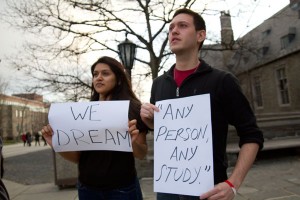Students at Cornell University are campaigning to implement a university-specific form of the Development, Relief and Education for Alien Minors Act.

A national DREAM Act, which did not pass in Congress, would have paved a path for children born outside the United States who were brought over before the age of 16 to gain legal immigration status. A DREAM Act would have given states the option to offer in-state tuition to students registered under DREAM, according to the Association of International Educators.
The DREAM Act was first presented to Congress in 2001. The U.S. House of Representatives approved a variation of the DREAM Act in 2010, but the U.S. Senate did not pass the bill, and it expired.
Cornell President David Skorton endorsed the DREAM Act in 2010, but some students claim more efforts to help undocumented students are needed. In October, a form of the DREAM Act was passed in California, but nowhere else in the United States yet.
A group of three Cornell students — juniors David Angeles and Jessica Perez and sophomore Luz Aceves — wrote a letter to Skorton in October that addressed the needs of undocumented students. Skorton responded in a private letter stating that Cornell would look into the proposals and work to find solutions, according to Angeles.
Skorton could not be reached for comment.
Marcela Cabello, a junior Cornell DREAM Act advocate, said the proposal includes three initiatives that would ease the financial and emotional stresses of undocumented students. The first proposal would collect private funding in order to provide more scholarship aid opportunities. She said the idea to have a Cornell DREAM Act is based off the Illinois DREAM Act that passed Aug. 1 and is designed to establish scholarships, college savings and prepaid tuition programs available to undocumented students.
“The issue of being able to pay for your education adds a lot of stress,” Cabello said. “Even when applying to school, that’s in the back of your mind.”
Angeles said without scholarships, most undocumented students would not have the resources to stay at the university.
“We would join a long list of private schools that do not have this unique population,” he said.
The second suggestion in the letter requests that the school implement a work study program that would allow undocumented students to volunteer as a way to receive financial benefits.
Carmen Martinez, a sophomore at Cornell and co-chair of Movimiento Estudiantil Chicano/a de Aztlán, said the organization is currently in the process of gathering funds from private donors.
Cabello said the program would help retain undocumented students because the extra money would help students pay for scholastic needs such as books.
“There are a lot of students who are here, get the grades and have to drop out their last year,” she said.
Amrita Rao, a Cornell sophomore who has family in India, said she agrees international students without proper papers should receive equal access to education if they can meet the institution’s standard of academics.
“They should be given the opportunity to receive an education here if they’re qualified, but should not be given special preference because of their international status,” she said.
Angeles said the third part of the proposal would grant undocumented students an adviser who would help with financial support, offer legal counseling and provide information for professors and faculty who interact with undocumented students.
“There is a fear of deportation,” Martinez said. “Students don’t know who they can trust, they don’t know if telling a professor could lead to a call to [Immigration and Customs Enforcement] or other measures.”
Xochitl Cruz, Cornell senior and president of Cornell MEChA, said undocumented students often face more stress than their peers because of their citizenship status.
“We have seen that the students who have told us that they are undocumented do have an added stress that needs to be addressed with a support system or safe space,” she said.







